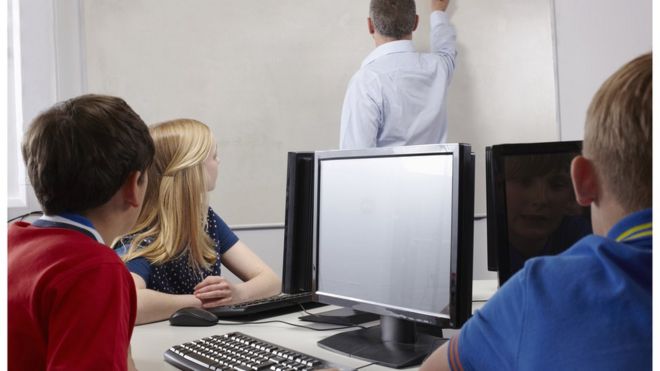
A revolution is under way in the teaching of computer science in schools in England – but it risks leaving girls and pupils from poorer backgrounds and ethnic minorities behind. That’s the conclusion of academics who’ve studied data about the move from ICT as a national curriculum subject to computer science.
Four years ago, amid general disquiet that ICT was teaching children little more than how Microsoft Office worked, the government took the subject off the national curriculum. The idea was that instead schools should move to offering more rigorous courses in computer science – children would learn to code rather than how to do PowerPoint.
But academics at Roehampton University, who compile an annual study of computing education, have some worrying news. First, just 28% of schools entered pupils for the GCSE in computing in 2015. At A-level, only 24% entered pupils for the qualification.
Then there’s the evidence that girls just aren’t being persuaded to take an interest – 16% of GCSE computing entrants in 2015 were female and the figure for the A-level was just 8.5% . The qualification is relatively new and more schools – and more girls, took it in 2016 – but female participation was still only 20% for the GCSE and 10% for the A-level.
It looks as though the few that did take the exams were very focused – girls got higher grades than boys in both the GCSE and the A-level.
Unsurprising
Carrie-Ann Philbin, a former computing teacher who works to engage children in coding at the Raspberry Pi Foundation, describes these figures as “disappointing but not surprising”. She points out that we are at an early stage in developing computing education and things should improve.
But she also thinks that the way computing is often sold as if its only purpose is to turn out a generation of programmers is a problem. “This only alienates teenage girls who already have a negative idea of what it is to be a ‘computer geek’.”
 Image copyrightGETTY IMAGES
Image copyrightGETTY IMAGESIt also appears that poorer children and those from ethnic minorities are less likely to be getting the computing education the government says is vital if the UK is to have the skills it needs to compete in the digital era.
Pupils on free school meals made up just 19% of GCSE entrants, when they are 27% of the population, and just 3.6% of students were black when they make up 4.7% of that age group.
But wasn’t the picture roughly similar for the old discredited ICT course? Well, no. While it is gradually being phased out, more pupils are still taking the ICT GCSE than computing, and the entrants are far more representative of the wider population. Forty-one per cent of GCSE entrants were female, and the exam had higher numbers of entries from children from low income and ethnic minority backgrounds.
Split emerging
“Computing and ICT had really quite different groups of students taking them,” says Miles Berry from Roehampton. “ICT was much closer to the average in terms of gender, low income, ethnicity and prior attainment in maths.”
His colleague Peter Kemp says diversity in the kind of children getting computing education is important. “We need to make sure that computer science becomes a subject at least as inclusive as the old ICT qualification. If the current disparities in access go unaddressed we risk wasting the opportunity to transform the tech industry into a more equal profession.”
They both worry that schools are looking at this new subject with some scepticism and deciding that there are other priorities when budgets are tight. In schools that are offering the new A-level in computing, class sizes tend to be small, raising the prospect, says the Roehampton report, that their economic viability will be questioned under new sixth form funding arrangements.
And while many teachers supported the move towards a more rigorous form of computing education, some who warned about the danger of throwing out the baby with the bathwater now feel vindicated.
Difficult
Drew Buddie, an ICT teacher who also acts as an examiner for the computer science GCSE, says the new exam is just too hard for many children, and is proving very stressful for teachers too. The result, he fears, is that “whole cohorts of students are now completely switched off doing ANY computer-related GCSE.” He says the content of the new course is so different that many ICT teachers just do not have the knowledge to teach it, and he fears that computer science could become a niche subject, taught in only a few schools.
The Department for Education is looking on the bright side. “The number of girls studying computer science has nearly doubled since last year and we want to see more follow their example,” a spokesperson said.
The DfE went on to say that “mastering Stem skills would ensure our future workforce has the skills to drive the future productivity and economy of this country”.
What it doesn’t say is that computer science can be creative and fun. Perhaps those words need to be inserted into the curriculum – otherwise many pupils and teachers may decide that computing is just too hard to bother with.
[Source:- BBC]








